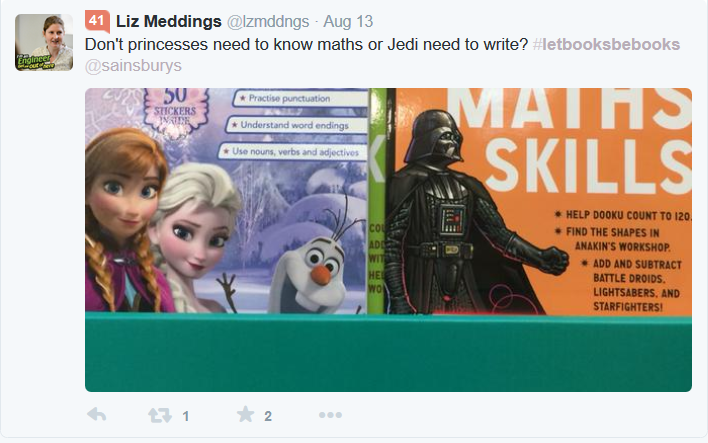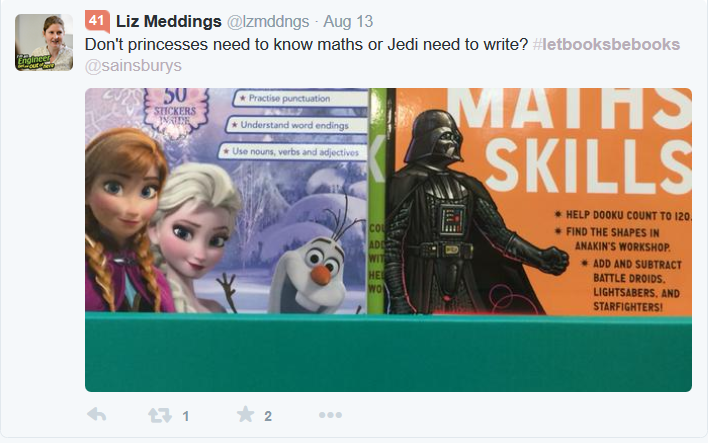It’s time for another Round Robin post, and this month’s topic is: Do you feel certain genres stereotype men and women? Why do you think that happens? How do you prevent it in your writing?
My short answers to those three questions are: I feel all genres are guilty of stereotyping, not just some of them; it happens because writers have been conditioned to think in stereotypes from an early age, just like anyone else, and it’s incredibly difficult to shake that off; I’m not sure I succeed in preventing stereotyping in my own writing, despite my best efforts.
Gender stereotyping in books starts as soon as children begin reading. Like nearly everyone in Britain of my age, I learned to read with Janet and John books. They featured a middle-class suburban white family, whose Daddy wore a shirt and tie and drove off to the office in his car, while Mummy stayed at home baking. Janet did sewing with Mummy, and John played football and went fishing.
You’d assume that everything has changed now, in these enlightened times, and that there isn’t such a high wall between the sexes in childhood, but you’d be wrong. If anything, I think it might be worse today than it ever was fifty years ago. There’s a campaign on Twitter called #letbooksbebooks, and you’ve only got to trawl through some of the tweets to start getting quite depressed.
How about this tweeted photo, taken in the children’s book shelves in Sainsbury’s?
I couldn’t believe this when I saw it. What this says to children is that reading and writing are for girls (why? is it because these particular skills are associated with expressions of emotion?) and maths is a manly subject for boys. (Why again?)
Whatever the reason, I think the saddest thing about this photo isn’t the fact that it makes girls look like they’re only interested in pink princesses and are too silly for maths. A lot of girls love Star Wars, and if there’s a picture of Darth Vader on a textbook it’s not going to put them off. Far from it. Far worse is the fact that boys are brought up to think that anything associated with the female sex must be beneath them, and so they wouldn’t touch that book on reading and writing skills with a barge pole. “Girly” is a belittling term. Why do you think J.K. Rowling used her initials instead of her first name? That’s right – it’s because boys have been conditioned to think that books written by women aren’t for them, and that – even worse – they will be ridiculed if they read such books.
To my mind, the damage being done to boys in this way is far worse than the damage being done to girls. Even though it’s still hard for girls to enter areas previously thought of as for boys only, it is becoming easier, and girls are certainly not ridiculed these days for showing an interest in football or rugby.
How many boys, though, learn to knit a sweater? Dress a doll? Play netball? Read a romance novel? We need to show boys growing up that these areas that are traditionally thought of as female are not inferior. Romance novels are all about emotions. They’re about listening to others, about compromise, about relationships with friends and family as well as lovers, and about learning to deal with our own flaws as well as learning to rub along with other people’s. These emotional skills are not seen as traditional masculine skills, but they could be if only boys weren’t pushed from an early age into thinking anything to do with emotions is for girls. It’s no wonder that mental health is one of the most serious health problems facing men today.
In recent years women have made great strides across the divide that separates them from men. Now it’s time for women to do their part by embracing everything seen as “feminine.” Yes, of course it’s great for women to be able to play football, but don’t throw the baby out with the bathwater. There’s nothing wrong with being skilled at knitting and needlework, and there’s nothing wrong – in fact women should be proud – to pass on traditionally female skills to their sons. I’d love to see boys being taught to make clothes for their dolls, and that The Little Princess and Anne of Green Gables are great books, even though they’re about girls. The stories we read have a great role to play in reversing gender stereotyping for boys, from childhood to adult, whatever the genre.
* * *
Thanks to Rhobin Courtright for another great topic. Please do check out what the other authors in our Round Robin have to say. It’s an interesting subject, and I’m looking forward to hearing their views.
If you have any thoughts or comments at all on the topic of gender stereotyping, I’d love to hear from you!
Other authors in the Round Robin are:
Beverley Bateman http://beverleybateman.blogspot.ca/
Diane Bator http://dbator.blogspot.ca/
Marci Baun http://marcibaun.com/blog/
Connie Vines http://connievines.blogspot.com/
Rachael Kosinski http://rachaelkosinski.weebly.com/
Anne Stenhouse http://annestenhousenovelist.wordpress.com/
Skye Taylor http://skye-writer.com/blogging_at_the_beach
Heidi M. Thomas https://heidiwriter.wordpress.com/
Fiona McGier http://www.fionamcgier.com/
Helena Fairfax https://helenafairfax.com/
Rhobin Courtright http://www.rhobinleecourtright.com/




Leave a Reply